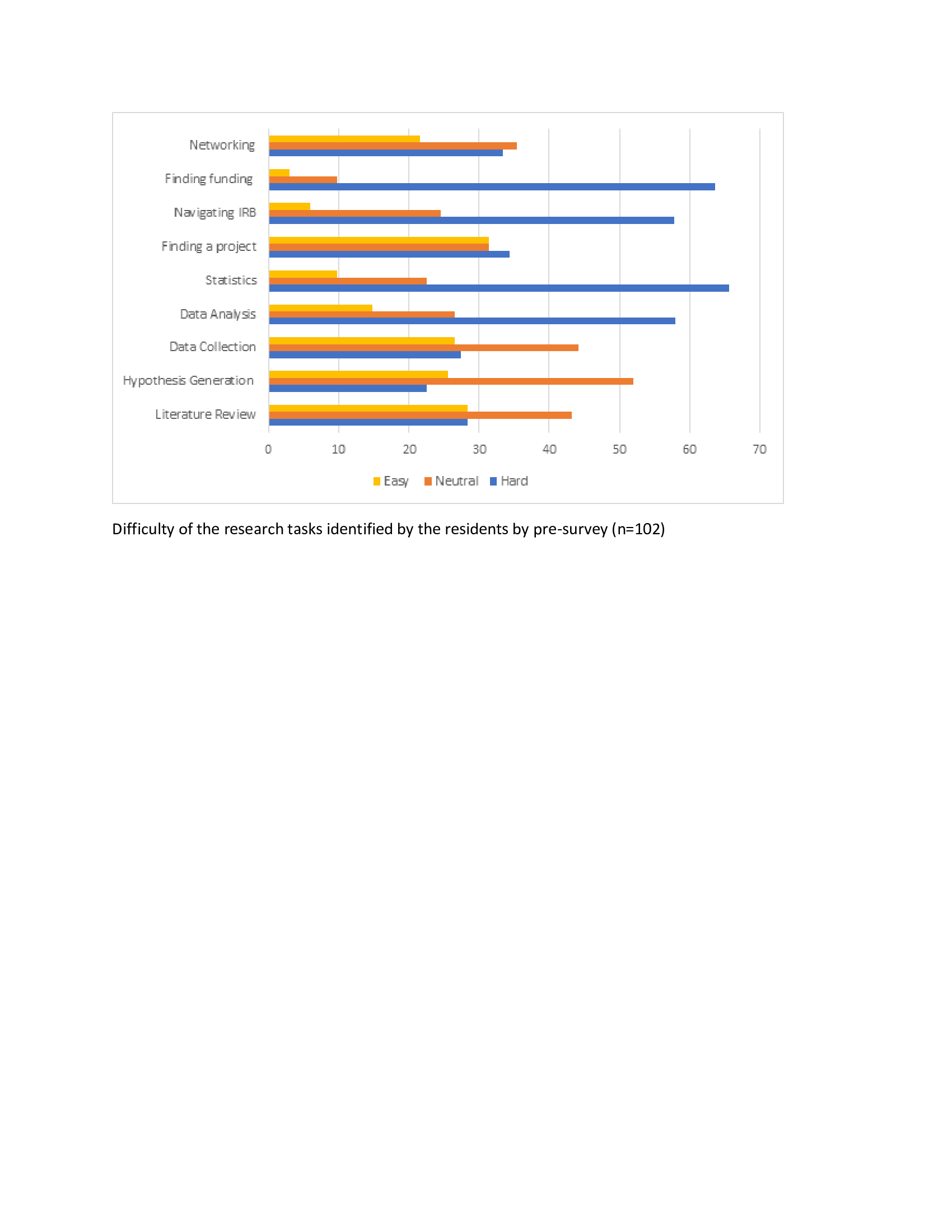Medical Education: Resident
Category: Abstract Submission
Medical Education 14 - Medical Education: Resident V
272 - Developing and Implementing Research Workshops into Pediatric Residency Training
Monday, April 25, 2022
3:30 PM - 6:00 PM US MT
Poster Number: 272
Publication Number: 272.420
Publication Number: 272.420
Etze Chotzoglou, University of Texas Southwestern Medical School, Dallas, TX, United States; Jo-ann Nesiama, University of Texas Southwestern Medical School, Coppell, TX, United States; Elizabeth M. Barksdale, University of Texas Southwestern Medical School, Irving, TX, United States; Kenneth Yen, University of Texas Southwestern Medical School, Dallas, TX, United States; Adeline T. Yang, University of Texas Southwestern Medical School, Dallas, TX, United States
.jpg)
Etze Chotzoglou, MD
Resident Physician
University of Texas Southwestern Medical School
Dallas, Texas, United States
Presenting Author(s)
Background: Integrating a research curriculum into residency training increases the number of research projects completed during residency, the use of evidence-based practices, and lifetime publications. The Accreditation Council for Graduate Medical Education expects residents to participate in scholarly activity. Historically, 20% of our residents had no experience with completing a scholarly product before residency. We aimed to create a hands-on curriculum to provide opportunities to learn from both mentors and peers and increase the likelihood of meaningful scholarly work.
Objective: Increase the quality and relative success rates of resident research, as measured by resident perception and scholarly productivity. To accomplish this, we: Designed workshops based on resident needs assessments and evidence-based practices from the literature. Evaluated efficacy and iteratively redesigned workshops based on learner feedback.
Design/Methods: Pre- and post-workshop surveys were administered to pediatric residents between June and October 2021. Sessions included focus groups facilitated by attendings and literature review workshops led by university librarians. Residents’ ratings of the difficulty of research tasks, as well as residents’ comments on the most valuable topics in the workshops and areas for improvement were collected.
Results: 102 residents attended the workshop and completed the pre-survey. 76 (74%) completed the post-survey (Table 1). 100 (98%) had prior research experience. The hardest research tasks were statistics (65%), finding funding (63%), navigating IRB (57%), and data analysis (57%). Reviewing the literature was found to be less difficult after the workshops (80% reported being less difficult). Finding a project (80%) and hypothesis generation (60%) were reported to be less difficult after completing the attending workshop. The most valuable workshop topics were exploring digital tools (70%), direct application of tools (13%) and project development (10%). Residents suggested that workshops can be improved by involving more discussion on research strategies (54%), project development (23%), and direct application of discussed skills/tools (15%).Conclusion(s): Implementing research workshops is an effective way to improve resident comfort and skillsets. Workshop topics focused on statistics, funding, IRB navigation, and data analysis would be high yield for future sessions. Our next step is to redesign workshops based on our residents' feedback and measure the long-term impact of the workshops on residents’ rate of presentations and publications.
CVetze_chotzoglou_cv_1.4.21.pdf
Graph 1. Difficulty of the research tasks identified by the residents by pre-survey (n=102)
Difficulty of the research tasks identified by the residents by pre-survey (n=102)
Objective: Increase the quality and relative success rates of resident research, as measured by resident perception and scholarly productivity. To accomplish this, we: Designed workshops based on resident needs assessments and evidence-based practices from the literature. Evaluated efficacy and iteratively redesigned workshops based on learner feedback.
Design/Methods: Pre- and post-workshop surveys were administered to pediatric residents between June and October 2021. Sessions included focus groups facilitated by attendings and literature review workshops led by university librarians. Residents’ ratings of the difficulty of research tasks, as well as residents’ comments on the most valuable topics in the workshops and areas for improvement were collected.
Results: 102 residents attended the workshop and completed the pre-survey. 76 (74%) completed the post-survey (Table 1). 100 (98%) had prior research experience. The hardest research tasks were statistics (65%), finding funding (63%), navigating IRB (57%), and data analysis (57%). Reviewing the literature was found to be less difficult after the workshops (80% reported being less difficult). Finding a project (80%) and hypothesis generation (60%) were reported to be less difficult after completing the attending workshop. The most valuable workshop topics were exploring digital tools (70%), direct application of tools (13%) and project development (10%). Residents suggested that workshops can be improved by involving more discussion on research strategies (54%), project development (23%), and direct application of discussed skills/tools (15%).Conclusion(s): Implementing research workshops is an effective way to improve resident comfort and skillsets. Workshop topics focused on statistics, funding, IRB navigation, and data analysis would be high yield for future sessions. Our next step is to redesign workshops based on our residents' feedback and measure the long-term impact of the workshops on residents’ rate of presentations and publications.
CVetze_chotzoglou_cv_1.4.21.pdf
Graph 1.
 Difficulty of the research tasks identified by the residents by pre-survey (n=102)
Difficulty of the research tasks identified by the residents by pre-survey (n=102)